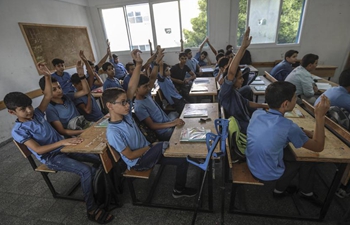CHICAGO, Sept. 5 (Xinhua) -- A genomic analysis has linked certain DNA mutations to a high risk of relapse in estrogen receptor positive breast cancer, while other mutations were associated with better outcomes, according to U.S. researchers.
The researchers at Washington University School of Medicine in St. Louis, the Baylor College of Medicine and the University of British Columbia analyzed tumor samples from more than 2,500 patients with estrogen receptor positive breast cancer, one of the most common forms of the disease.
They found that although mutations in DDR1 and NF1 are rare, they are associated with early relapse, which makes them much more common in patients who unfortunately die from the disease.
One unique element of the study was the age of the samples. Many were over 20 years old, allowing the researchers to know the full history of how the patients fared.
The study also confirmed past work showing that relatively common mutations in genes called MAP3K1 and TP53 had opposite effects on tumor aggressiveness. Patients with MAP3K1 mutations did well, while those with TP53 mutations were likely to have a recurrence.
The study has identified three genes, namely DDR1, PIK3R1 and NF1, with relatively uncommon mutations that were associated with cancer recurrence and spreading.
"We would like to help doctors identify patients who are likely to do well versus those who are likely to have a recurrence," said first author Obi L. Griffith, an assistant professor of medicine and an assistant director of the McDonnell Genome Institute at Washington University School of Medicine.
"Those with mutations that are associated with a good prognosis may need less intensive therapy than they might otherwise receive. But if a patient's tumor has mutations linked to high risk of relapse, it's useful to know that early so they can be treated with more aggressive therapies or even potential investigational therapies that could be targeted to their specific mutations," Griffith added.
The researchers also pointed out the importance of continuing to sequence cancer genomes.
More than 266,000 women in the United States are diagnosed with invasive breast cancer each year, according to the American Cancer Society, and about 70 percent of cases are estrogen receptor positive.
The study was published on Tuesday in the journal Nature Communications.













